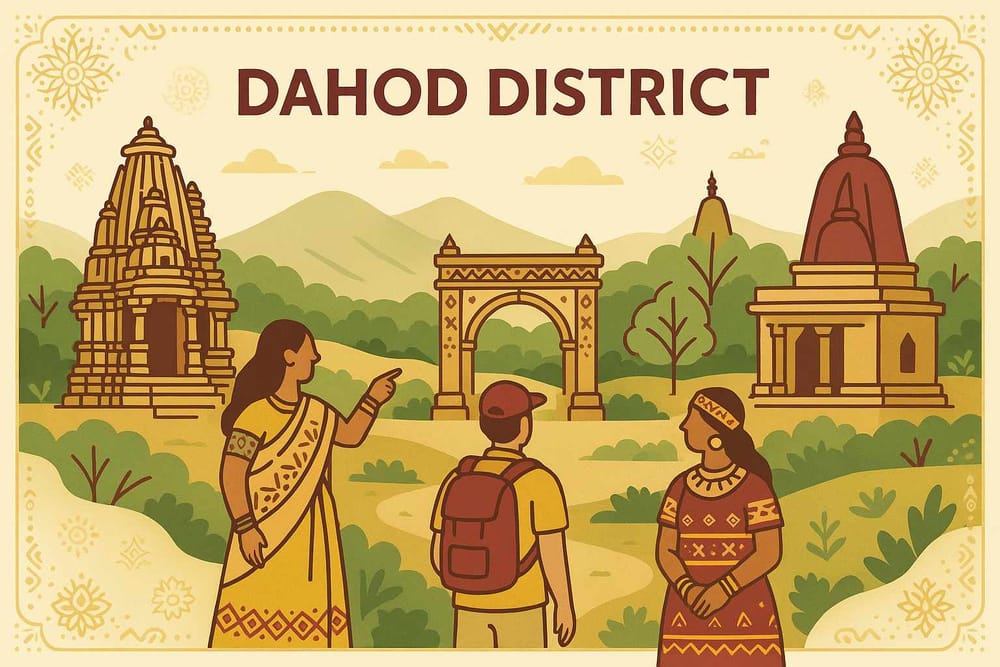
Dahod Explored: District Overview - What You Need to Know
Sometimes, the most beautiful stories of our country aren't found in bustling cities but in its quiet, unassuming corners. There are places that hold centuries of history in their soil and carry the rhythm of ancient traditions in their air. Dahod, nestled in the eastern part of Gujarat, is one such place. It’s a land where history, nature, and a vibrant tribal culture come together, and today, I want to share its story with you, from the heart.
A Walk Through History's Corridors
Every place has a story, and Dahod’s is truly fascinating. Imagine this – it was right here, in the year 1618, that the Mughal Emperor Aurangzeb was born. This single fact gives the town a unique place in the grand tapestry of Indian history. But Dahod’s spirit isn’t just about emperors. Its true strength lies in its people. During our freedom struggle, it was the tribal communities of this region who stood tall, resisting British rule with immense courage. Their resilience is a powerful reminder of the spirit that runs through rural India.
As you travel through the district, you can still feel echoes of the past in its ancient temples and forts. These structures aren't just stone and mortar; they are silent storytellers of a glorious era, showcasing architectural brilliance and timeless faith.
Where Three States Meet: The Land and Its Lifelines
Dahod has a very special location. It’s fondly called 'Dohad', which means 'two boundaries', because it sits right at the tripoint where Gujarat, Madhya Pradesh, and Rajasthan shake hands. This unique position has always made it a melting pot of cultures and a hub for trade. The land is blessed by rivers like the Panam and Anas, which flow like lifelines, making the soil fertile and supporting the lives of thousands who depend on agriculture.
The landscape itself is a mix of gentle hills and forests, home to a wonderful variety of plants and animals. The weather here follows the classic Indian rhythm – hot summers, life-giving monsoons, and cool, pleasant winters. Many people ask about the best time to visit, and I’d say the months from October to February are perfect, when the air is cool and the land is lush and welcoming.
The Soul of Dahod: A Tapestry of Tribal Culture
To truly understand Dahod, you have to experience its vibrant tribal culture. The Bhil community, in particular, forms the heart and soul of this region. Their way of life, their colourful clothes, their rhythmic folk dances, and their soulful music – it’s a beautiful celebration of tradition. If you’re ever here during festivals like Holi or Diwali, you’ll see an unmatched enthusiasm and devotion that is deeply moving.
And for those who appreciate art, Dahod is a treasure trove. The local markets are filled with stunning handicrafts and textiles, each piece telling a story of the artisan's skill and heritage. You can truly find authentic tribal art here, a perfect piece of Dahod to take back with you.
The Earth's Bounty: Life and Livelihood
Agriculture is the backbone of Dahod. The fields here are rich with crops like maize and wheat, and livestock rearing is a common sight. But Dahod is also looking towards the future. Small-scale industries are beginning to take root, creating new opportunities for the local youth. It’s wonderful to see that Dahod has been chosen as one of the cities to be developed as a Smart City, a step that promises progress while respecting its traditional roots.
The district is administratively divided into seven talukas, including Dahod, Jhalod, and Limkheda, each with its own unique charm and character. While Gujarati is the main language, the air is often filled with the sounds of Hindi and the melodic tribal language of Bhili, reflecting the beautiful diversity of its people.
Unveiling Dahod's Treasures: What to See and Do
For a traveller seeking authentic experiences, Dahod is an unexplored gem. You can explore ancient temples in places like Devgadh Baria or visit the historic forts that whisper tales of bygone eras. For nature lovers, the Ratanmahal Sloth Bear Sanctuary is a must-visit, offering a chance to see these amazing animals in their natural habitat.
Exploring hidden gems is a journey of the soul. Just as we shared the spiritual calm of a lesser-known destination in our complete guide to Gotri, Dahod offers its own unique paths for the curious traveller. Visiting a tribal village here gives you a chance to connect with a simpler, more grounded way of life and witness centuries-old traditions firsthand.
Dahod: Where Tradition Meets a Bright Future
Like any developing region, Dahod has its share of challenges. But the spirit of its people, combined with efforts from various organisations, is paving the way for a brighter future through better education and healthcare. There is immense potential here for eco-tourism and organic farming, which can bring prosperity while preserving the natural beauty of the land.
Dahod is more than just a place on a map. It’s a living, breathing story of history, resilience, and culture. It’s a reminder that the heart of India beats strongest in its villages and towns, where tradition and progress can walk hand in hand.
Connect with Your Roots Through Bhaktilipi
At Bhaktilipi, we believe stories like that of Dahod are the threads that weave the beautiful fabric of our culture. Our purpose is to bring you these timeless stories, devotional literature, and rich traditions in a way that feels personal and inspiring. We help you explore your heritage and deepen your spiritual understanding with authentic, well-researched knowledge.
Stay connected with us on this beautiful journey. For daily inspiration and updates, subscribe to our YouTube channel, follow us on Facebook, and join our community on Instagram. Let’s explore the soul of India, together.
A passionate group of people dedicated to preserving India's knowledge of Dharma, Karma, and Bhakti for ourselves and the world 🙏.
